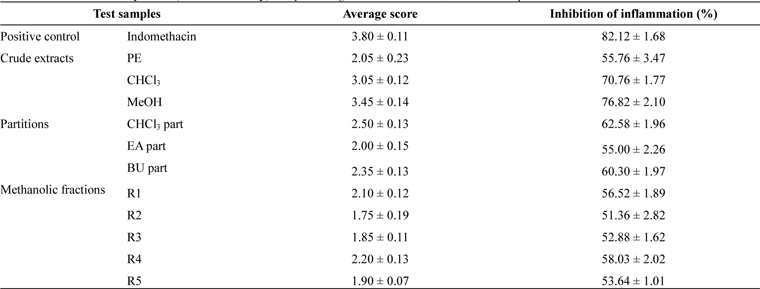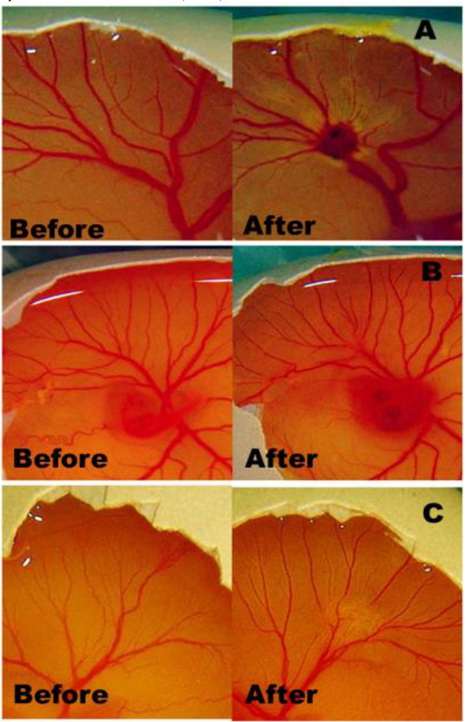



Gynura segetum, family Asteraceae is a cultivated species and can be found growing in the tropical regions of Indonesia and Malaysia. The plant is known for its use for the treatment of cancer, inflammation, diabetes, hypertension and skin afflictions. In the current study, anti-inflammatory effect of Gynura segetum leaf has been investigated. The present study investigated the in vivo anti-inflammatory effect of Gynura segetum leaf by using hen’s egg test-chorioallantoic membrane (HET-CAM) assay. Different solvent extract of Gynura segetum leaf were tested, the most active methanol extract was further fractionated and tested. Among the extracts tested, the methanol extract showed a significant good anti-inflammatory effect (76.8% inhibition at 50 μ) on the HET-CAM assay as compared with the anti-inflammatory drug indomethacin (82.1% inhibition). However, the fractionated sample exhibited a significantly lower activity in comparison to crude methanol extract. The results demonstrated that Gynura segetum leaf displayed remarkable anti-inflammatory effects, which support the folkloric uses of this plant for treatment of inflammation.
Herbal Herbal medicines are the therapeutic experiences of generations of practicing physicians of traditional medicine over hundreds of years and they are known to be oldest health care products that have been used by mankind all over the world to treat various types of ailments (Torey et al., 2010). Currently, attention is being focused on the investigation of the efficacy of traditionally used plants as they are affordable and have fewer adverse effects (Masresha et al, 2012).
Gynura segetum, family Compositae (Asteraceae) is a cultivated species and can be found growing in the tropical regions of Indonesia and Malaysia. Gynura segetum has drawn a lot of attention due to its uses in traditional medicine. The plant is known for its use for the treatment of cancer, inflammation, diabetes, hypertension and skin afflictions. A variety of chemical compounds has been identified from this genus such as flavonoids, pyrolizidine alkaloids, triterpenes, sterides and sesquiterpenoids (Zhu et al., 2013).
In previous study, the leaf extracts of Gynura segetum showed potential anti-angiogenic effects in chick embryo chorioallantoic membrane (CAM) model (Seow et al., 2011). Anti-angiogenic activity of Gynura segetum’s leaf extracts provided a pharmacological basis on its folkloric use for the treatment of inflammatory diseases and cancer.
Anti-angiogenic strategies are emerging as an important tool for the treatment of cancer and inflammatory diseases. Therefore, researchers are growing interests in using natural anti-angiogenic agents, especially extracted from plants (Peng et al., 2009). Most of the research on anti-angiogenic agents has been directed towards inflammation treatment (Ahn et al., 2007; Jung et al., 2009; Kim et al., 2004; Krenn and Paper, 2009). Collectively, this suggested that many herbs and their phytochemicals may exert both anti-angiogenic effects and anti-inflammatory activity. Thus, there is an interest to discover local medicinal plant for anti-angiogenic and anti-inflammatory effects.
Although the plant is traditionally used in inflammatory disorders, but to the best of our knowledge, there is lack of research on the use of leaf extract of Gynura segetum in inflammation. Therefore, investigation of anti-inflammatory effects of Gynura segetum would be desirable. In the present study, the anti-inflammatory activity of Gynura segetum’s leaf was evaluated in a modified version of the chicken chorioallantoic membrane assay (HET-CAM assay), as this model is an in vivo model chronic inflammation, which in this study induced by Sodium dodecyl sulfate (SDS).
The leaves of
>
Plant extraction and fractionation
The extraction of
The test substances and control were dissolved in DMSO (0.05%) to reach final concentration of 5 mg/ml. For the preparation of the discs, 10μl of these solutions were applied dropwise on sterile filter paper of 3mm diameter, dried under a laminar flow hood to give concentration of 50 μg per disc. Indomethacin was applied as positive control and CAMs treated with 10 μl of DMSO (0.05%) as blank control.
>
Hen’s egg test-chorioallantoic membrane (HET-CAM) assay
The HET-CAM assay was performed according to the method of Burgermeister et al. (2002) with some modifications. Discs of every test substances as well as positive control were placed on 10 - 15 eggs, each. The effects were compared to those of DMSO (0.05%) discs and disc with 50 μg/disc SDS. All tests run in triplicate and the evaluation was performed using a score system followed by the conversion of the score index in the proportional inhibition of inflammation: Inhibition < 40%, no anti-inflammatory effect; Inhibition 40 - 55%, uncertain antiinflammatory effect; Inhibition 55 - 70%, weak antiinflammatory effect; Inhibition 70 - 85%, good antiinflammatory effect; Inhibition > 85%, strong antiinflammatory effect.
The data was expressed as means ± SEM. Statistical comparison between groups was analyzed by one way analysis of variance and post hoc Tukey’s test (SPSS, Inc., version 20).
Anti-inflammatory activity of

Anti-inflammatory effect (HET-CAM assay) of Gynura segetum’s leaf extracts, fractions and positive control
Among the extract tested, the methanol extract showed good anti-inflammatory activity with inhibition 76.8% (50 μg/disc). The methanol extract neutralized the formation of blood vessels around the granuloma and the capillaries network appeared normal (Fig. 1C). The anti-inflammatory effect of methanol extract was almost comparable to the antiinflammatory drug indomethacin at the same concentration. Methanol extract did not show any statistically significant difference as compared with indomethacin (
Further fractionation on the most active methanol extract was carried out and five fractions obtained were tested at the same dosage (50 μg/disc). All these fractions (R1 to R5) exhibited lower activity than the crude methanol extract. There was no significant difference (
To the best of our knowledge, this is the first report of the anti-inflammatory activity of
The modified of the chicken chorioallantoic membrane assay (HET-CAM assay) is an in vivo model chronic inflammation. Chronic inflammation involves proliferation, migration and recruitment of tissue and inflammatory cells, which damaged the normal tissue. Inflammatory tissue is hypoxic and induces angiogenesis through upregulation of factors such as vascular endothelial growth factor (VEGF). The angiogenic factor stimulates the proliferation and migration of endothelial cells in existing blood vessel to generate the new blood vessels. New blood vessels maintain the chronic inflammatory by transporting inflammatory cells to the inflammation site and supplying the nutrients and oxygen to the proliferating inflamed tissue (Griffioen and Molema, 2000; Jackson et al., 1997; Walsh and Pearson, 2001).
According to Jackson et al. (1997), angiogenesis and inflammation are codependent processes. An inflammatory state can promote angiogenesis, and angiogenesis can facilitate chronic inflammation. Earlier study had demonstrated that the leaf extracts of
In the present study, the methanol extract of
In conclusions, this study demonstrated that the methanol extract of

